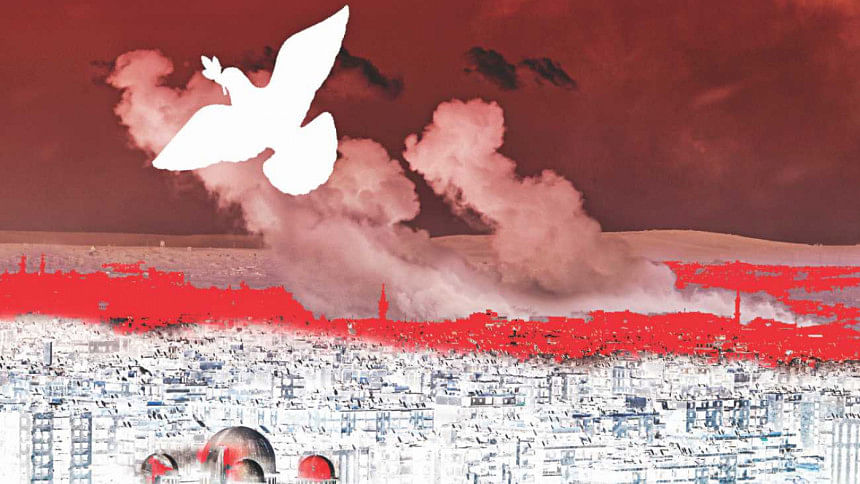Syrian War for the Uninformed

Syria's civil war has been a bloody affair for 6+ years. As the body count rises and foreign influence reshapes the political implications, the Syrian War has turned into quite the Battle of Hogwarts. The rebel Death Eaters are fighting Assad's corrupt ministry, while Russian centaurs and US giants continue to butt heads.
Okay, that reference didn't fully make sense, but at this point, neither does the Syrian conflict. Comprised of multiple sides, each with its own agenda, the BIG question remains - "Who stands to gain from this catastrophe?"
In December 2010, a series of uprisings – collectively referred to as the Arab Spring – broke out in Tunisia to overthrow President Zine El Abidine Ben Ali. The revolution was caused by high unemployment, and lack of freedom of speech, among others. The Tunisian Revolution influenced revolts in Libya, Egypt, Yemen, Iraq and Syria.
In Syria, peaceful protests broke out in March 2011, following the mutilation and death of 15 children in Daraa for anti-government graffiti. In typical Lord Voldemort fashion, President Bashar al-Assad retaliated by killing hundreds and arresting thousands of demonstrators. In July, the protesters, aided by some Syrian troops, responded with violence by shooting back at the police. These defectors from the Syrian Army called themselves the Free Syrian Army (FSA) and wanted to establish democracy in Syria. Thus began the 21st century's most gruesome conflict, the Syrian Civil War.
Who's against whom?
Since the formation of the FSA, the civil war has been fraught with more plot twists than Game of Thrones. Initially, extremist groups fought alongside the rebels to overthrow the Assad regime. Then, ISIL sought to establish an Islamic state in the region, and began to attack other Syrian rebel groups and the Kurds who threatened their extremist vision. By 2014, ISIL was going by the name of ISIS, which better reflected their aim to expand across Syria.
In 2012, Jabhat al-Nusra, the Syrian branch of Al-Qaeda, entered the foray. But that partnership was short-lived as they announced a split from Al-Qaeda in 2016. As ISIS and Al-Nusra began fighting each other, Kurdish groups set out to earn independence in Northern Syria. The Iran-sponsored Lebanese Hezbollah fought for Assad while the Gulf States, including Saudi Arabia, continue to support the rebels.
Assad's recapture of Aleppo from the rebels saw the induction of yet another rebel group who took up arms to fight for Idlib, western Aleppo and parts of Latakia.
Enter Russia and the US
The US has been openly hostile towards the Assad regime but they were reluctant to directly involve themselves in Syria's conflict. That changed on April 7, 2017 when the Trump administration launched 59 Tomahawk missiles at Assad's Syrian Air Force Base in retaliation for the chemical attack in Khan Sheikhoun. While Assad has gone on record to say he wasn't behind the chemical attacks, the US believes otherwise. Since 2014, ISIS has been the US's primary target, and they've often launched airstrikes on ISIS strongholds. Even though the US initially gave the illusion of non-participation, the CIA has, in fact, been training Syrian rebels over the years.
Meanwhile, Russia claims to be attacking terrorist groups but so far, their actions seem to benefit only Assad. Russia has even vetoed a UN resolution that entailed an investigation into the use of chemical weapons in Syria.
The governments of Shia-majority countries, such as Iraq and Iran, are close allies of Assad whereas, Sunni-majority countries, including Turkey, Qatar and Saudi Arabia, support the rebel groups.
Now what?
On April 4, 2017 more than 80 people, including children, were killed due to a chemical attack in the town of Khan Sheikhoun in Syria. People around the world were outraged at the images of suffocating children that circulated in social media. The victims were exposed to sarin nerve gas, whose symptoms include breathing difficulties, nausea and loss of bodily functions.
The Syrian government has been accused as the perpetrators even though Assad claims that this is a ploy by the US to justify retaliation against him. Since then, he's gone on record to say "We don't know whether those dead children were killed in Khan Sheikhoun. Were they dead at all?" Assad's strategy since the beginning of this war has often involved denying responsibility or even the authenticity of incriminating events.
The biggest casualties in this on-going power struggle have been the civilians who've lost everything during this bloody war. According to the UNHCR, almost 4.8 million Syrians have fled to Turkey, Lebanon, Jordan, Egypt and Iraq. Over 6 million are displaced within Syria. Fighting in Damascus made it impossible for help to reach almost 300,000 people in need of immediate humanitarian assistance.
By the end of 2016, Assad recaptured Aleppo from the rebels with the help of Russia and Iran. Presently, the Syrian government controls Damascus, parts of southern Syria and Deir Az Zor, the majority of the area around the Syrian-Lebanese border, and the north-western coastal region. Rebel groups, ISIL, and Kurdish forces control the rest of Syria.
Since the war began in 2011, the death toll has reached a staggering 470,000. For the refugees, the Syria they knew as home now exists only in their memory. The question the world must answer now is this: how do you put a nation back together that's seen nothing but destruction for over 6 years?
Mithi Chowdhury is deeply disturbed and troubled by the woes of the Syrian people. If you feel the same, find her at [email protected]

 For all latest news, follow The Daily Star's Google News channel.
For all latest news, follow The Daily Star's Google News channel. 



Comments